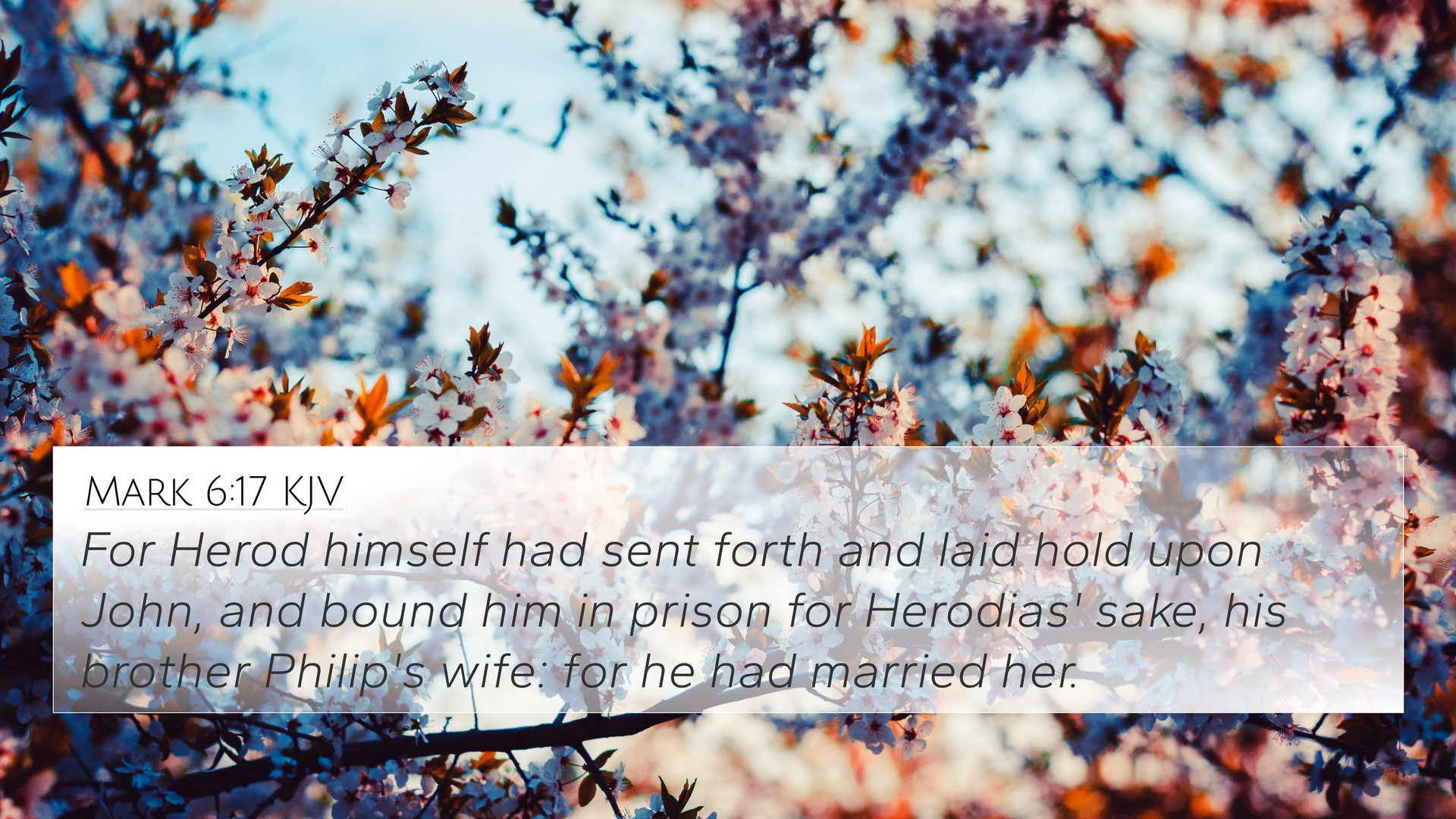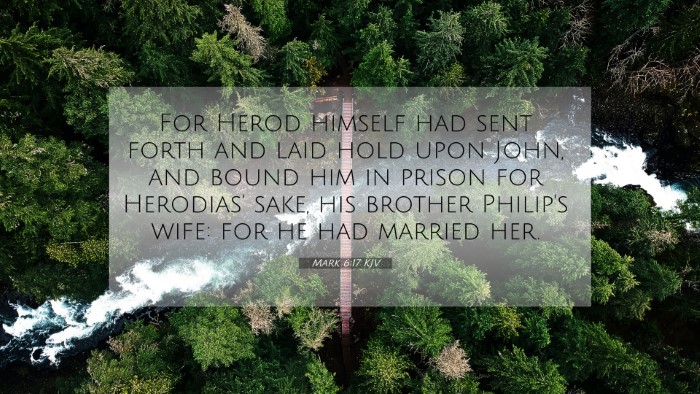Understanding Mark 6:17
Mark 6:17 reads: "For Herod himself had sent forth and laid hold upon John, and bound him in prison for Herodias' sake, his brother Philip's wife: for he had married her." This verse narrates a pivotal event in the life of John the Baptist, highlighting the political intrigues and moral failures of leaders.
Contextual Overview
This passage occurs within the broader narrative of Jesus' ministry, shedding light on the contrasting responses to divine truth. John the Baptist's imprisonment signifies the rejection of righteousness in favor of worldly desires.
Commentary Insights
-
Matthew Henry Comments:
Henry emphasizes the moral conflict displayed by Herod, who, despite recognizing John's righteousness, succumbs to the pressures of sin and scandal. This demonstrates how power can corrupt judgment and lead to tragic outcomes.
-
Albert Barnes' Analysis:
Barnes highlights Herod's desire for John’s teachings but contrasts that with his actions. The verse shows how political and familial ties can lead individuals to compromise their morals, evident in Herod's unlawful marriage.
-
Adam Clarke's Perspective:
Clarke notes that the conflict arises from Herod’s unlawful marriage to Herodias, which is further complicated by Herod's fear of John’s influence. The events are a testament to the power of conscience and the repercussions of ignoring it.
Thematic Connections
Mark 6:17 allows for various thematic connections within Scripture, notably:
- Righteousness vs. Sin: The verse encapsulates the struggle between divine truth and human folly.
- Fear of Consequence: Herod’s actions reflect a fear of public opinion and personal repercussions, a universal theme in moral decision-making.
- Prophetic Voice Silenced: John the Baptist's imprisonment signifies how society often silences those who speak truth to power.
Bible Verse Cross-References
Understanding Mark 6:17 can be enhanced by examining related verses:
- Matthew 14:3-5: Provides details on John the Baptist's imprisonment by Herod.
- Luke 3:19-20: Highlights the consequences of John’s rebuke of Herod, focusing on his marriage.
- Matthew 4:12: Indicates the geographic context of John’s imprisonment and Jesus' ensuing ministry.
- John 3:30: Reflects John the Baptist's attitude towards his diminishing role as Jesus' ministry grows.
- Mark 1:9-11: Discusses the ministry of Jesus and John’s baptism, setting the basis for the events that follow.
- Acts 13:24: Refers to John’s role in preparing the way for Jesus, enriching the understanding of his significance.
- Mark 15:16-20: Exhibits the betrayal and punishment theme that begins with John's imprisonment and culminates in Jesus' crucifixion.
Inter-Biblical Dialogue
The account in Mark 6:17 invites reflection on the themes of integrity, power dynamics, and the prophetic tradition, encouraging an analysis of:
- The role of prophets in confronting sin (e.g., 2 Samuel 12:1-7 concerning Nathan and David).
- Human authority clashing with divine mandate (e.g., Acts 4:19-20, where the apostles refuse to stop preaching).
- The complexities of familial relationships and sin (e.g., 1 Corinthians 5:1-2, addressing immorality within the church).
Conclusion
Mark 6:17 stands as a sobering reminder of the cost of discipleship and adherence to truth against the backdrop of societal and political pressure. Recognizing the connections between Biblical texts enriches our understanding, guiding us to remain steadfast in righteousness.
Further Study Tools
For those interested in deepening their study, consider the following:
- Utilizing a Bible concordance for cross-referencing similar themes.
- Engaging in cross-reference Bible studies to identify interconnectivity across scriptures.
- Exploring comprehensive Bible cross-reference materials for thorough analysis.







